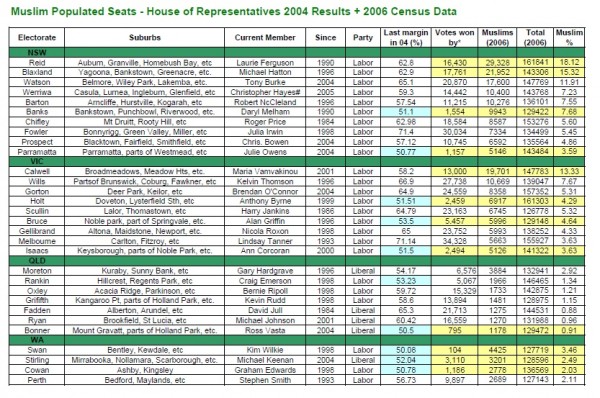
Lead
1. to go before or with to show the way
2. to conduct by holding and guiding
3. to influence or induce
4. to guide in direction, course, action, opinion, etc.
Definition of “Lead” – www.dictionary.com
As an Australian and a Muslim voting in today’s election, just like a growing number of other Australians, one feels no sense of inspiration to support any of the two major parties in Labor and Liberal.
What happened to the concept of political leaders being exactly that….leaders!
Leaders are supposed to ally the fears, harness the dreams and aspirations, and courageously lead the people on a path of enlightenment to the betterment of their society. They are supposed to lead for all the country’s citizens. Rich or poor, black or white, young or old – the state of a society is ultimately judged by how it treats each individual. True Leaders are supposed to highlight and encourage the positives of a society and down play and deal with the negatives.
Sadly our politicans no longer live up to these basic aspirations.
They live in a superficial world of instant gratification that has no vision beyond the next opinion poll or focus group findings at worst or the relevant election cycle at best. When you are planning for next week or next year instead of the next decade, you can do no true justice to any real issue of significance.
Is it any wonder that people have become so cynical and disenchanted with the whole political process. Being treated with gross contempt and betrayed of acting upon a sense of a greater social consciousness for the overall good of all, the average voters have been left to also cynically decide on the basis of “what’s in it for me”.
I am still undecided if our politicans are a mere reflection of societies values or are a contributing factor to it.
My observations of our values today are that we have become an every increasingly selfish, dumbed down (to the level of a 3 minute attention span with the intellect of a 12 year old – if you don’t believe me this is exactly the time frame and language style that tabloid media like A Current Affair/Today Tonight and The Daily Telegraph/Herald Sun are constructed in), obsessed with instant gratification, directionless and inward looking society. We have lost our sense of vision and to an ever increasing number of us, our sense of social justice and equality for all.
When such a zeitgeist exists, perhaps we don’t shouldn’t blame the politicans for the manner in which they lead us. Maybe the age old theory that the leaders are a mere reflection of a society hold true. But whether it is the chicken or the egg, something dramatically has to change.
I believe that people expect far more from their leaders, be they political or religious, and that they are crying out for someone to inspire and guide them through an increasingly uncertain and ever changing world.
In order for this process to start on a political front, a clear message should be sent to Australia’s political leaders.
That is why I am advocating that everyone that votes today should do so with the following intentions in mind:
1 – Vote to improve the standing of the minor parties and independents to create a greater diversity of opinions and political options. Parties like the Greens and Family First should be supported, despite some issues with some of their policies and alliances (I will write more on this in a future blog).
2 – Vote to make your seat as marginal as possible. This is particularly important for Australian Muslim voters who generally treated with political contempt because they live in seats that have the highest margins.
Imagine for example if the 16% of Australian Muslim voters of the western Sydney seat of Blaxland (centered around the Bankstown area) were to vote for anyone but the sitting Labor member. Because the seat is held by the same 16% margin, this would make the seat marginal. It is a open secret that marginal seats get the most attention/funding.
Now imagine if this was repeated in another 3-4 seats – like Reid, Barton, Watson and Calwell, where Australian Muslims make up at least 10% of the population. When we have serious prospects of a hung a Parliament in today’s election and the fact that elections are generally only decided by a handful of seats, this becomes very significant. Australian Muslim voters if they every became organised enough to block vote could play a major role in determining who gets elected to government. As the Australian Muslim population is relatively young (according to the 2006 census 60% under the age of 29 compared to 40% for the entire Australian population), this potential political strength will only increase over time.
Here is analysis that was done for the 2004 election:
Perhaps Australian Muslims becoming politically active can be a solution to the punching bag and dog whistle recipient political status they have endured for the last decade. And before I get the usual barrage of emails, Muslims have no intention of introducing Sharia law. They just want a dose of the famous Australian “fair go”. Nothing more, nothing less.
On the election here is an interesting analysis that all political junkies I am sure will enjoy. It seems someone that has far more political insight and knowledge agrees with some of my thinking.
—————————————————————————————-
The Woman who could not wait
Peter Botsman
http://www.workingpapers.com.au/publishedpapers/2860.html
In later life Julie Gillard will think back on 2010 with consternation. Whether she wins or loses the election tomorrow, she will wonder about whether it would have been better to wait for the opportunity to become Leader of the Labor Party and Prime Minister of Australia. Gillard was bred to be ruthless, in deposing Rudd she followed sage Labor advice. But later, and even now, having endured question after question about the fate of Kevin Rudd, her conscience will have been pricked but most of all she will wonder whether she was a pawn for others.
Whatever happens now Gillard will always be judged on the way she became leader of the Australian Labor Party. If she loses Gillard will deeply regret her deposition of Kevin Rudd. If Kevin Rudd had won the election, he had clearly anointed her as his replacement. In the year 2011 or 2012, she would have made an easier ascendancy. If Tony Abbott had beaten Kevin Rudd, Gillard would have been made boss in 2011, would have been Leader of the Opposition against Abbott, and would have been seen as the hope of the progressive forces in the future. If Rudd had won she could have looked forward to a more comfortable ascension. We know now that Gillard commanded overwhelming strength of numbers in the Labor caucus. After a second victory Rudd would have been tapped on the shoulder just in time for Prime Minister Gillard to develop a comfortable third term election strategy. Both of these paths would have been more honourable pathways to national leadership.
If Gillard wins tomorrow then she will also wonder about the wisdom of the coup against Rudd. She will wonder because she will only have just sneaked back into government with a margin that was not much better than Rudd’s worst poll numbers. Life will be much tougher and harder than it ever was for the Rudd government. There is every likelihood the greens will control the Senate. The Abbott opposition will be galvanised by their strong electoral performance and believe that it is only a matter of time before they win government. Abbott’s performance in bringing a first term government to the edge of oblivion will be applauded and Joe Hockey and Malcolm Turnbull will be kept at bay. The coalition will be cohesive and their mode of attack on the Gillard government will simply be to continue on with their current arguments against the sloppiness of Labor ? a government out of touch, feeding on debt and hostage to the Greens.
As the erstwhile Latham has already obersved there will also be, lined up at the new Prime Ministers door, a series of contenders, many of whom would have previously begged Gillard to stick the knife into Rudd, looking to get her job.
So what was it in the Gillard psychology and in the constitution of the contemporary Australian Labor Party that caused the move against Rudd?
There is nothing wrong with a clean, clear move against a leader. The problem is these days in the modern Labor party nothing is clean or clear. Whereas once there were people of character assessing the mood of the nation, today there are opinion polls and focus groups and party professionals. Such people who work at the nerve centre of the major political parties, do not know how to talk to human beings, they simply read trends in numbers. The Federal Labor Party secretariat envisioned by its great founder Cyril Wyndham was supposed to be outside of politics. Today it is a haven for such creatures and a tool of ambitious factional hacks all vying for a break over their rivals.
The entrance of women into Labor party positions and the parliament has done nothing to alleviate the corruption of Labor’s organs. It has perpetuated and heightened it. Labor’s affirmative action policy was first introduced into party thinking in 1981 and was given increasing substance in the form of quotas whereby it was expected that 40 per cent of party positions would be occupied by women by 2012. It was an extremely strong policy that is a tribute to many Labor women activists in the 1970s and 1980s. But its fatal flaw was that its implementation depended upon the existing party powerbrokers being behind it. The affirmative action policy changed the gender of party officials, party representatives to Labor party conferences and party parliamentary representatives but it did not change the nature or make up of the Australian Labor Party. In fact it arguably gave stronger influence to powerful, stale patriarchs than would have been the case if they had been challenged by women and men who represented new thinking about Labor and the nature of the party as was the case in the Labor party of the UK and the Democratic Party in the USA. Every nation’s progressive institutions have their quirks and weaknesses. The greatest problem of the Australian Labor Party, like the Australian constitution, is it is an extremely conservative institution that tends to entrench powerful interests regardless of their legitimacy.
Over the 1990s and 2000s men who were ?well beyond their used by dates’ used women to hold on to their positions within the Labor Party. Power-brokers and factional leaders scrambled to recruit loyal women from their own ranks to meet the party quotas of 20, 35 and 40 per cent women representatives and officials. Many older Labor leaders who were, and are now, accustomed to having breakfast, lunch and tea prepared by loyal wives, their children reared by loyal wives and their emotions calmed by loyal wives who kept the home fires burning (while they attended to more important matters) gave their benediction and influence to a flotilla of women who owed their power and influence to them. The new recruits tended to be extremely uncritical about the nature of the Labor machined. In fact grandmothers, sisters, aunties, mothers, wives and daughters were recruited on mass to head the symbolic political march to a more equitably gendered party. The most important thing was that the integrity of the factional influence was protected, and this was particularly important across all States and within the Federal machine for the Catholic right but also for the left factions. Having fought against the affirmative action policy for many years, the party’s bosses were well placed to use it to retain their own influence and power.
There were also a great number of extremely talented Labor women who emerged in this period and Julia Gillard was one of them. But ironically this alliance between the new Labor women and the older factional leaders took place at the same time as a major structural shift away from the structure of Labor in our economy and society. The affirmative action policy and the ability of the party bosses to use it meant that there was no deep understanding of the real issues facing Australian families moving away from traditional labor structures as well as patriarchal power structures. It also stymied any possibility of a more grass roots, democratic Labor party emerging. The new women union representatives, officials and representatives owed their existence to the old structure of Labor power not to any new form or possibility. Affirmative action meant that the structures of power and influence within the party did not change.
The women who excelled were part of a generation who did not have the organic links to new dynamic forces shaping our economy and society. Party professionals and leaders no longer work in unions to really represent their members. They do not do an apprenticeship in working life. A short term position in a union is just a step to political power. Instead of spending years alongside working people, aspirants go to university and learn how to spin jingles about ?working families moving forward?. They do law degrees but spend very little time, as little time as possible, in the magistrates courts dealing with grubby criminals and learning about the very real and fundamental questions of life and death in neighbourhoods. They dream about the constitution and abstract symbolic matters of state.
Later they become television heroes on morning talk shows but don’t know how to speak to their neighbours or their partners and families, let alone communities. It was this bubble of self interest that created a more fickle, non-organic approach to government policy, political leadership as well as the politically immature move against Kevin Rudd.
Those who advocate for a strong internal women’s policy within the Australian Labor Party may well ultimately be vindicated. I am sure that the women pioneers within the Labor Party would still argue that, whatever the costs, the current revolution is worthwhile. They will argue that from within the ranks of the female party hacks, good women will emerge quicker than would have been the case without the affirmative action policy. I hope they are right.
However all this does not change the scenario for Julia Gillard. She must live with the fact that she was a pawn for the ambitions of the Labor party’s factional bosses when she deposed Kevin Rudd. She must live with the fact that the deposition of Kevin Rudd was far from a clean, clear contest. It certainly was not even within the ethical mindset of the last generation of labour hacks. Even someone like Graham Richardson will have been surprised by its audacity. It belongs, as we have stated before, in the mindset of political commentators like Janet Albrechtson, Andrew Bolt and The Australianwho admire the sheer efficiency of a political machine turning over a poll unfriendly leader ruthlessly.
For ordinary people all this plays out differently. They may even vote for the ulimate political warrior of the right, Tony Abbott, because they perceive him to be a softer soul. After all they live in a world of increasingly ruthless bosses at work, bureaucrats and politicians many of whom are female. Many of whom are called upon to take the tough and nasty decisions which their male counterparts will not take.
Until the week before the challenge, Gillard had pledged her loyalty to Rudd as Prime Minister. Party professionals will have told her that this profession of loyalty did not matter. ?It was all for show. Everyone knows the game’ she will also have told herself. ?I am the best hope to beat Tony Abbott. I have his number? she will have told herself. But, of course, on the streets, in the workplaces, in the neighbourhoods and in real life, it does matter that when someone professes loyalty that they mean it. Just as the knowledge of those that work in hot ceilings installing insulation amongst dangerous electrical wires is fundamental to the success of a nationwide bureaucratic endeavour to insulate the nation’s houses.
Just as the experiences of those who have worked in remote communities experimenting with different housing models for Aboriginal families and failed and learned and failed and learned and failed and learned is more important than simply making a budgetary allocation to wish all these practical realities away. Just as the hardnosed views of parents who jealously guard the resources of their children in schools is far more important than the ideas of a new generation of well meaning bureaucrats who have never taught in schools, who have never been administrators in schools and have never even tapped the knowledge of those who have designed safe buildings and playgrounds for children.
We live in a world where symbolism often triumphs over substance. The public know, and women know too, that gender is sometimes a guise for the ruthlessness and hollowness that follows from this empty world. When there are unpopular and unpalatable things to be done and deeply devisive decisions to be taken it is interesting that women now often rise to the fore for better and for worse. Women in working life, in public institutions and in industry are often able to take actions and decisions that take the breath away from the toughest of their male counterparts. These are the things that the advocates of a new feminism for the 21st century must now contend with.
These are the things that Julia Gillard, whether she is Prime Minister or a humble Labor backbencher, will have to think about as she moves forward with her new life and career. Let us hope that she reflects well upon these matters and provides the kind of leadership that is so needed across our country today. Let us hope that Labor women move out and away from the shadows of the stale Labor factions and start to create a new kind of party that is not just a political advertising company but an organic part of our community. Let us hope..
But do not hold your breath. There are many interesting independent representatives and minor parties that deserve consideration tomorrow. Though it may well be premature to trust them with government, with the major parties so moribund, in the long term the well being and future of our country may depend upon investing in a new wave of candidates and parties. Australian citizens need more political choice and the major parties need more competition. If a Federal candidate or party gets more than 4 per cent of the formal first preference votes they receive electoral assistance of over $2 per vote in support from taxpayers. So supporting a candidate or or party get above this quote is a good thing.
By supporting minor parties and independent candidates get over the 4 per cent quota revives our political system and gives us a new injection of candidates and ideas than those which the major parties currently dish up to us. So put this in your mind as you place a tick or a cross for your first preference in the house of representatives and senate on your ballot paper!!







